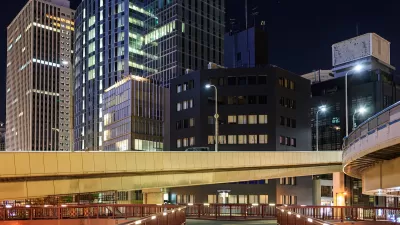The city could emulate Calgary, New York, and other cities in supporting office conversions as a way to boost floundering downtown economies and provide much-needed additional housing.

In an article for the San Francisco Chronicle, Noah Arroyo provides an in-depth look at Calgary’s effort to convert vacant downtown office buildings into housing, arguing that San Francisco could follow its example to do the same.
According to Karen Chapple, director of the School of Cities at the University of Toronto, who has studied the issue, San Francisco has the slowest downtown recovery of 60 major North American cities, in part because of the expense and difficulty of converting office buildings to residential uses.
In Calgary, “The government pursued office-to-housing conversions for their dual benefits: reducing the overall supply of office space so that the remainder was more valuable, and increasing the housing supply.” When Calgary’s downtown began to empty out, “Canadian officials responded to the long-term decline of its business district with a 10-year, $1 billion initiative — equivalent to about $721 million U.S. dollars — to transform the area into a diverse, thriving neighborhood, in large part by funding and fast-tracking projects that convert offices to housing.”
The city identified an area with suitable properties, targeting incentives there to encourage developers. “To date, five conversions have been approved to create 707 units of housing.” The article describes other measures Calgary took to streamline the conversion process and lower costs.
Meanwhile, “San Francisco officials are weighing whether to help conversions happen — but not just to create new housing.” A spokesperson for Mayor London Breed said the city is also looking at other uses, such as light manufacturing or lab space, that could help diversify the city’s core and prevent an overreliance on one industry. Rich Hillis, director of the San Francisco Planning Department, cautioned against converting offices to housing too hastily, saying that “moving away from this too prematurely can have implications that include the loss of business and the revenue that goes with them.”
FULL STORY: Yes, S.F. could turn empty downtown offices into housing. Here’s what it would take

Planetizen Federal Action Tracker
A weekly monitor of how Trump’s orders and actions are impacting planners and planning in America.

Maui's Vacation Rental Debate Turns Ugly
Verbal attacks, misinformation campaigns and fistfights plague a high-stakes debate to convert thousands of vacation rentals into long-term housing.

Restaurant Patios Were a Pandemic Win — Why Were They so Hard to Keep?
Social distancing requirements and changes in travel patterns prompted cities to pilot new uses for street and sidewalk space. Then it got complicated.

In California Battle of Housing vs. Environment, Housing Just Won
A new state law significantly limits the power of CEQA, an environmental review law that served as a powerful tool for blocking new development.

Boulder Eliminates Parking Minimums Citywide
Officials estimate the cost of building a single underground parking space at up to $100,000.

Orange County, Florida Adopts Largest US “Sprawl Repair” Code
The ‘Orange Code’ seeks to rectify decades of sprawl-inducing, car-oriented development.
Urban Design for Planners 1: Software Tools
This six-course series explores essential urban design concepts using open source software and equips planners with the tools they need to participate fully in the urban design process.
Planning for Universal Design
Learn the tools for implementing Universal Design in planning regulations.
Heyer Gruel & Associates PA
JM Goldson LLC
Custer County Colorado
City of Camden Redevelopment Agency
City of Astoria
Transportation Research & Education Center (TREC) at Portland State University
Jefferson Parish Government
Camden Redevelopment Agency
City of Claremont





























